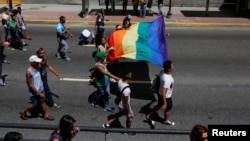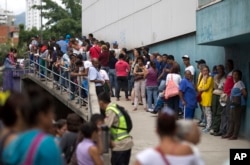Venezuela's shrinking economy has sparked an exodus of LGBT people as the economic crisis has put the brakes on the country's growing tolerance toward its gay and trans community, activists Reuters.
Not that Venezuela was ever an easy place to be different.
For years, Daniel Arzola endured homophobic abuse from his neighbors in Maracay, a city in the north of Venezuela.
Homophobic slogans were daubed on the walls of his house and he was shouted at in the street.
"One day, a group of neighbors tied me with old cables to an electric pole and they threw fireworks at me," he told Reuters from Chile. "They also put out some cigarettes on my body, while others destroyed all the drawings that I brought with me."
Eventually, Arzolo, a 29-year-old artist, was forced to flee his native Venezuela for Chile.
"My answer to all this was to try to ignore them, but you can't ignore it forever," he said.
Arzola's story is not unique, but things may be getting worse.
"The impact of the crisis on LGBT+ people is evident," said Tamara Adrian, a lawyer and politician living in Caracas, Venezuela's capital. "As a vulnerable population, they do suffer the consequences of the crisis much worse."
There are no official figures on the number of gay or trans migrants, but according to the United Nations' refugee agency, three million people have fled Venezuela, with the majority heading for neighboring Colombia.
Over the past three years, the Venezuelan economy has shrunk by a third, resulting in what has been described as the worst economic crisis to hit the country in its history.
The turmoil has pushed gay rights to the bottom of the pile of priorities, with funding for many organizations and resources either reduced or cut entirely, a number of LGBT Venezuelans told Reuters.
A government limit on the sale of food has also penalized same-sex couples.
Under the government's family food bag scheme, same-sex couples were excluded.
"For this scheme, a census of families was ordered," Quiteria Franco, general coordinator at Union Afirmativa de Venezuela, told Reuters from Venezuela's capital Caracas. "This measure affected families made up of same-sex couples, because they were not counted as they are not considered families."
Transgender people are also struggling to find food supplies because the Venezuelan government does not issue identity documents that recognize their gender identity.
"Supermarkets were forced to install biometric reading machines so that each buyer could be identified and know how many products they have bought and when to avoid hoarding," Franco said.
"This system of buying and selling affected trans people, due to the incongruence between their gender identity and the legal identity reflected in their identity document."
The economic crisis has also led to a spike in human trafficking, with trans people particularly at risk.
There has been a rise in "human trafficking of trans women, as well as of biological women and young men, forced into sex work in Spain, Panama, Colombia, Dominican Republic and other countries," Adrian said.
A better life
Adrian Ynfante from Altagracia de Orituco, a town in the north of Venezuela, left his hometown in search of a better life in Colombia.
"Venezuela is a hard country. The culture [toward LGBT people], instead of improving, is getting worse every day," Ynfante, a transgender man, told Reuters from Colombia. "Living in Venezuela is now so complicated, but even more so for LGBT+ people."
With the country's health infrastructure stretched to a breaking point by the economic turmoil, a lack of drugs and medical supplies has particularly affected those living with HIV — both gay and straight.
According to the United Nations, there were 120,000 people living with HIV in Venezuela in 2016.
"The complex economic situation has greatly impacted UNAIDS work in the country," said Regina Lopez De Khalek, Venezuela's country manager for the UNAIDS program. "The health ministry has been limited in acquiring antiretroviral drugs, supplies for diagnostic and control tests, as well as condoms and other supplies."
Coming home
A resolution to the economic and political turmoil in Venezuela may be a long way off, but many LGBT migrants have found that their situation is often not much better in their host countries.
"In Colombia, you can't find a lot of opportunities when you're a migrant," Ynfante said. "And even less so if you're a transgender person."
"I have thought about [returning to Venezuela]," he added. "But the answer is no."
Arzola in Chile is also closely monitoring events back home.
"The situation in the country is much worse than when I left," he said. "Venezuela is a wound that does not close, but it keeps opening every day."






